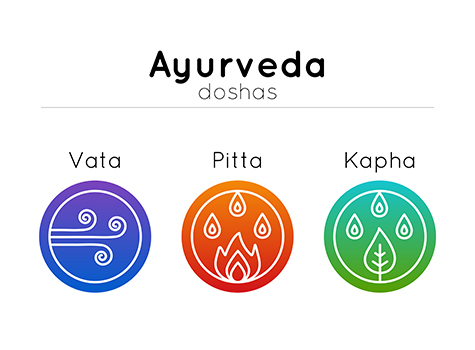
First of all, thank you to those of you who messaged me about this column missing from the June issue. From now on, you will see my column on alternate months.
Recently there has a been a lot of focus on Integrative and Functional Medicine from a Western perspective. So, I wanted to focus a little more on Eastern healing practices, and specifically Ayurveda. I know I have mentioned some tips about digestion and other tidbits in my previous articles, but I wanted everyone to have some basic foundational knowledge. For that purpose, I reached out to Nidhi Agrawal for her expertise. Hope you learn some useful tips from my interview with her.
What are the basic principles of Ayurveda?
Ayurveda is the ancient system of living a healthier and happier life. Ayurveda teaches us the relationship between living and its surrounding environment. It discusses practical approaches for taking care of the universe, which we are a part of, and teaches us to a bring balance of mind-body-spirit. Each person has a unique constitution in relationship with the universe. According to Ayurveda, humans (microcosm) are part of the universe (macrocosm).
Our physical makeup is a combination of five essential elements present in the universe – ether, air, fire, water, and earth. Each element has its own characteristics, and principle. According to Ayurveda there are four aspects we need to keep in balance to maintain the health of mind, body, and spirit and these are: The Doshas, Dhatus, Malas and Agni.
Can you briefly explain how the elements and doshas are connected?
The essential elements (ether, air, fire, water, and earth) are building blocks of all matter. All creations, including humans, are made of combinations of these five elements. These essential elements are manifested in humans in three energies, called TRIDOSHA-Vata, Pitta, and Kapha.
The doshas are energies that make our constitution and govern our body, mind and spirit. Each dosha is made up of two of the five elements (ether, air, fire, water, and earth). Vata dosha is a combination ether and air, Pitta is a combination of fire and water, and Kapha is combination of water and earth elements. The doshas exhibit the characteristics of the elements from which they are made of. All diseases are caused by an imbalance of the doshas, and this imbalance is caused by intake of improper diet and by leading an unhealthy lifestyle.
The constitution you are born with is called your Prakruti, and an expert Ayurvedic practitioner can tell your Prakruti by your pulse diagnosis.
What does Ayurveda say about the importance of gut health?
According to Ayurveda, all diseases occur due to dysfunction of Agni – the biological and digestive fire that helps with the metabolism and digestion of food, maintains the natural gut flora by killing foreign bacteria and toxins and supporting the growth of the healthy bacteria. Agni also aids in breaking down the food, its absorption, and its assimilation into the body for its proper functioning. Hence, it is important to include foods which aid in the process of digestion to keep the digestive fire strong and gut flora healthy.
How can we improve gut health and overall physical/mental/environmental health?
In Ayurveda, food itself is the medicine. If we consume a wholesome well-balanced diet which provides strength and happiness to both our body and mind, we will not need any medicine.
According to Ayurveda there are six tastes that originate from the five elements. These are sweet, sour, salty, pungent, bitter, and astringent. All tastes essentially originate from the water element. We need each of these six tastes in our daily diet. Ayurveda recommends having sour and salty taste along with food to boost your appetite and digestion. However, to keep the doshas in balance, based on your health, constitution and season; the amount of these tastes on a daily basis may vary.
Deficiencies in the elements or doshas (space, air, fire, water, and earth) result in illnesses. When our doshas are in balance, diseases are kept away, and our body stays healthy. The key is to eat everything in moderation. Emotional wellbeing is also maintained by choosing tastes based on our constitutions and doshas. Our health mainly depends upon the absorption of these elements through food. When our Agni, the digestive fire, becomes weak or impaired, Tridosha become imbalanced and the metabolism, digestion, absorption, and assimilation of the food also get affected. The undigested food accumulates in the intestine and generates toxins. Accumulated toxins weaken the body’s immune system and afflict body, mind, intellect and senses.
In summary, Ayurveda believes in unification of all aspects of life, self and environmental as one integrated into another. In holistic terms it means to keep the balance of both microcosm and macrocosm.
Can you please share tips/recipe for probiotic foods that people can make at home?
We can consume natural probiotics, like yogurt, kanji, and homemade pickles in our daily food to increase the growth of healthy gut bacteria. Avoid pickles with too much salt and oil. Try making quick pickles with veggies and fruits by adding little bit of salt, herbs. Keep them for a day or two and consume them quickly. Simple pickles created from ingredients such as Amla, lemon, mango mixed with some salt, asafetida (hing), and mustard, and kept overnight are best for their probiotic benefits. Try to avoid adding vinegar or any preservative when making pickles. Not all pickles contain good probiotics properties, especially the commercial ones.
Nidhi Agrawal, Ph. D. Biochemistry, is an Ayurveda Passionate and Health and Wellness influencer. She is one of the founders of Wheels of Wellbeing (WOW), Wheelofwellbeing.com. WOW is a health and wellness community platform connecting like-minded people to lead happy and healthier life. You can reach her at [email protected]
Recipe: Kanji

Here’s a recipe for Kanji. Kanji is a tangy and salty fermented drink, which contains a lot of probiotics. It may take some time to develop a taste for it, but it is a great drink to enhance the digestion if taken in moderation.
Ingredients:
1 tablespoon mustard seeds
2-3 large carrots (traditionally, the recipe requires black carrots, but you can substitute with orange ones)
1 medium size beet
5-6 cups water
1 tablespoon sea salt as per taste
A pinch of chili powder (optional)
A pinch of Asafetida (hing) powder (optional)
A pinch of chili powder (optional)
Method:
Coarsely crush mustard seeds in a mortar pestle or a coffee grinder. Peel and slice carrots and the beet. Place carrots and beets pieces in a clean mason jar or any glass jar with a lid. Add water into the jar, make sure all the veggies are covered with water. Add all the other ingredients in the jar. Stir with a wooden spoon to make sure all the ingredients are mixed properly and then close the lid. You can also use cheese cloth to cover the jar. Let the jar sit in a preferably sunny or warm spot for few days. Try to stir with a wooden spoon daily. Usually when it is fermented, the mustard seeds start to float and once the kanji develops a tangy flavor it is ready. You can eat the veggies and drink the liquid. Store in the refrigerator but bring it to room temperature before you drink.
———-
Parul Kharod, MS, RD, LDN is a registered dietitian and licensed nutritionist and works as a Clinical Dietitian with Outpatient Nutrition Services at WakeMed Hospital in Cary and Raleigh. She can be reached at [email protected]
Posted: Monday, July 12, 2021



